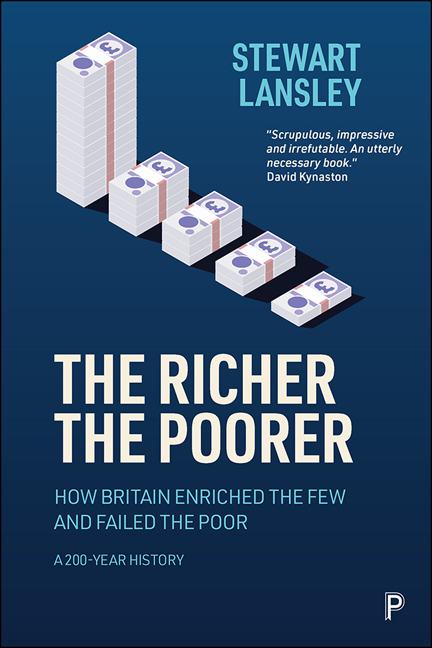Book contents
- Frontmatter
- Miscellaneous Frontmatter
- Dedication
- Epigraph
- Contents
- List of figures
- Preface and acknowledgements
- Introduction: Knighthoods for the rich, penalties for the poor
- PART I 1800–1939
- PART II 1940–59
- PART III 1960–79
- PART IV 1980–96
- PART V 1997–2010
- PART VI 2011–20
- Afterword: COVID-19 and ‘the polo season’
- Notes
- Index
- Frontmatter
- Miscellaneous Frontmatter
- Dedication
- Epigraph
- Contents
- List of figures
- Preface and acknowledgements
- Introduction: Knighthoods for the rich, penalties for the poor
- PART I 1800–1939
- PART II 1940–59
- PART III 1960–79
- PART IV 1980–96
- PART V 1997–2010
- PART VI 2011–20
- Afterword: COVID-19 and ‘the polo season’
- Notes
- Index
Summary
Part of the reason for these flaws was that although the much-heralded postwar consensus was real, it was also shallow. The official committee established by the wartime cabinet to examine the Beveridge report argued that the proposals would, by abandoning the principle of deterrence on which social relief had always been based, encourage fecklessness. The committee also expressed doubts about the need for family allowances and argued that, if needed, they should be paid in kind not cash. Similar issues have continued to dog the progress of social reform.
The ‘people’ versus the ‘old gang’
David Cannadine has described the 1945 election as ‘a contest between “the people” and the “old gang” ‘. This was especially stark among the armed forces. As the American critic Edmund Wilson noted when mingling among British troops in Greece, there was an almost ‘complete class line-up’ between troops and officers. He could find ‘no English soldier who had not voted for Labour and only one officer who had’.
The old gang –the traditional upper classes, City grandees and the new industrial rich, along with some members of the professional classes –did not sign up to the new welfare priorities. While the post-war reforms enjoyed widespread public support, they were, added Cannadine, widely viewed by the wealthy classes as an attack on ‘aristocrats, the rich, bankers, doctors, newspaper owners and shareholders’. In her 1948 political satire Tory Heaven, Marghanita Laski portrayed a totalitarian Tory government enforcing the unwritten rules of the British class system, and its hierarchy of privileges, through a strict system of social classification –A, B, C, D and E. Breaches of the rules meant being downgraded by the ‘Degrading Court’ to a lower class. In Frederick Raphael's novel of a group graduating from Cambridge in the 1950s, The Glittering Prizes, one of the key aristocratic characters, Lady Frances, describes the Attlee government as ‘the greatest tragedy in our history since Henry the Eighth’. Some leading academics also opposed the levels of redistribution accompanying the reforms. Lionel Robbins, a leading anti-collectivist economist at the London School of Economics described them as ‘quite indefensible’, arguing they involved a ‘discrimination against enterprise and ability such as has never before existed … in any large scale civilized community’.
- Type
- Chapter
- Information
- The Richer, the PoorerHow Britain Enriched the Few and Failed the Poor: A 200-Year History, pp. 74 - 80Publisher: Bristol University PressPrint publication year: 2021



